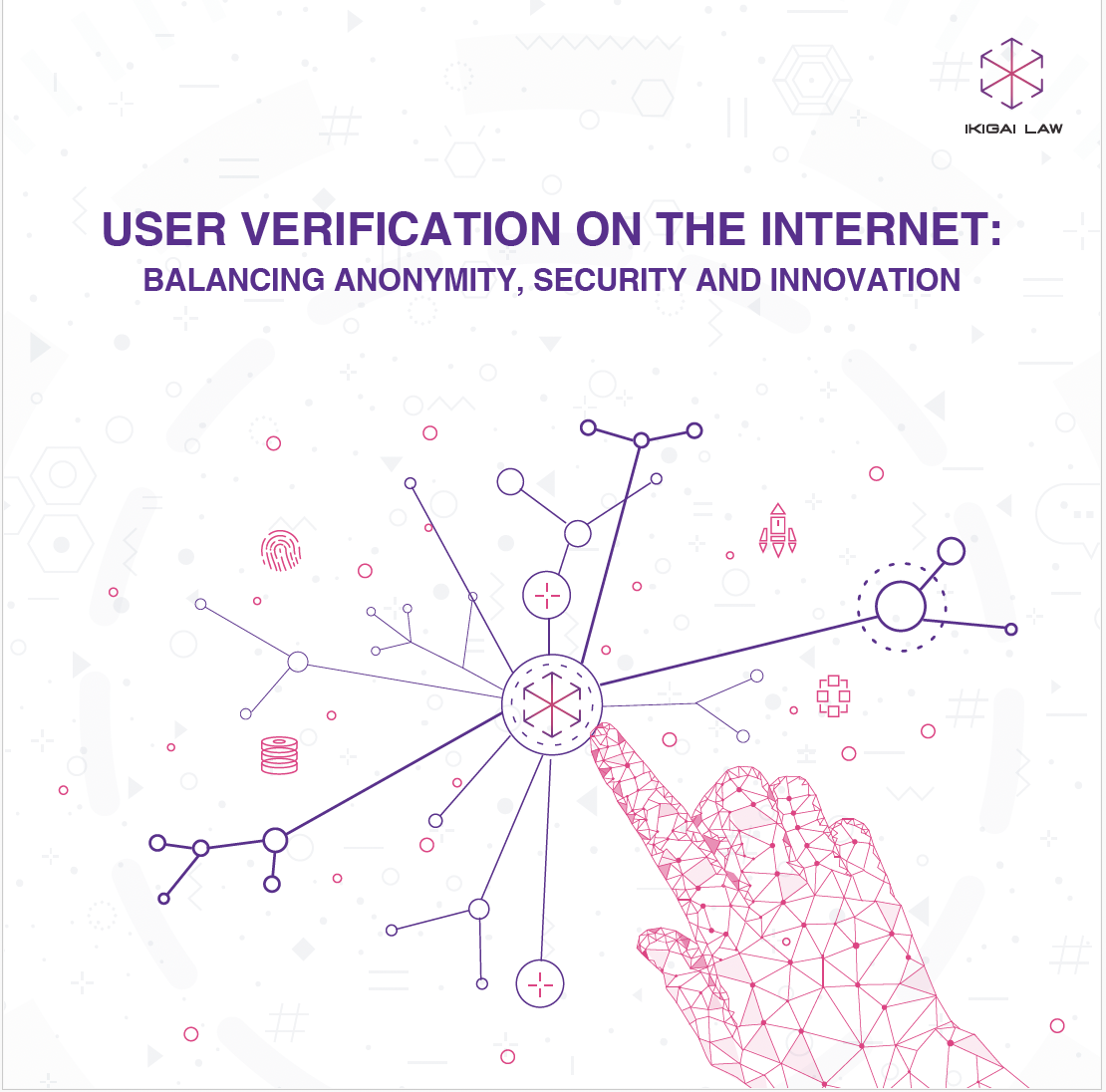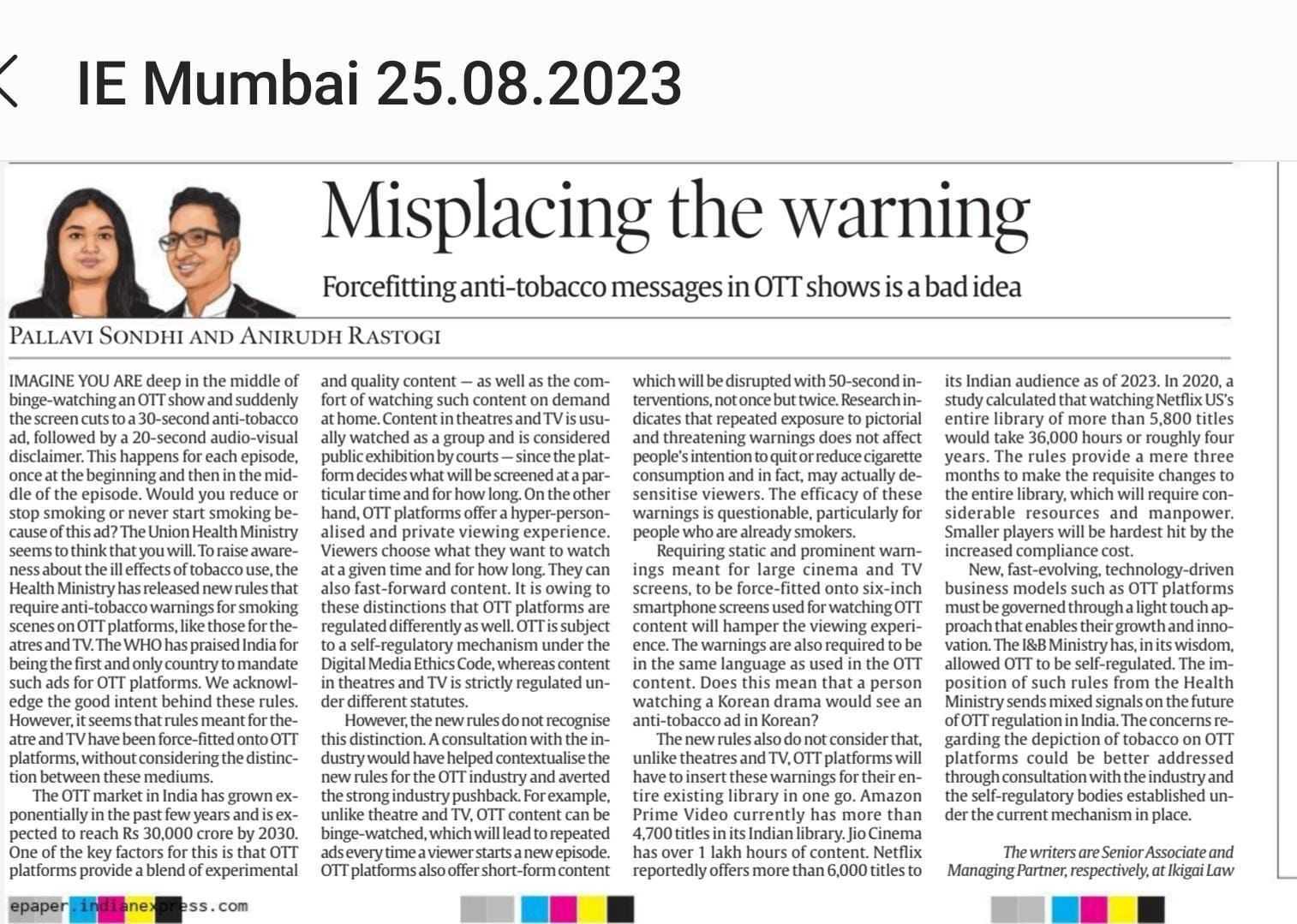On 10 November 2023, the Union Ministry of Information and Broadcasting (MIB) released the Draft Broadcasting Services (Regulation) Bill, 2023 (Bill) for public consultation. In this post we share on overview of our broad comments and suggestions on the clauses of the Bill as submitted to the MIB.
Broad comments and recommendations
1. OTT streaming services should be kept outside the purview of the Bill: The draft Bill introduces the term ‘OTT broadcasting service’ and brings OTT streaming services under the same regulatory umbrella as broadcasting services such as cable and radio broadcasting. However, there are fundamental differences between the two modes of content distribution. Broadcasting involves transmission of content which is from one-to-many and simultaneous. i.e. the same content is broadcast simultaneously for all viewers. This is different from a unicast, which is one to one transmission of content. For instance, on OTT platforms, any viewer can choose the specific content to watch, which will be streamed only to her, and not to everybody at large. Broadcasting follows a pre-determined schedule for all viewers, and the viewer can only watch the content being broadcast at a particular time. OTT streaming offers curated catalogue of content on-demand, where viewers have the freedom to choose what to watch. Thus, OTT streaming is considered as pull content, since the viewer chooses or pulls content from the platform’s library of content whereas broadcasting is referred to as push content, since the viewer can only watch what is pushed to her. However, the Bill does not account for these differences and treats OTT streaming services at par with broadcasting services. Additionally, it is because of these distinctive features of OTT streaming services (freedom of choice, private viewing experience etc.), that OTT platforms have been subject to a light touch co-regulatory approach under the Information Technology (Intermediary Guidelines and Digital Media Ethics Code) Rules, 2021 (IT Rules). However, the draft Bill now brings OTT streaming platforms under the same regulatory bracket as broadcasting services and imposes similar compliances on them. This will create an onerous compliance regime for the OTT industry, create barriers to entry and stifle growth and innovation in the sector, ultimately reducing consumer choice. It will also pave the way for executive censorship of online content and threaten free speech and artistic freedom and expression. Further, adequate provisions already exist under the Information Technology Act 2000 (IT Act) to regulate OTT streaming services. OTT streaming platforms have no place in a bill that aims to streamline the regulatory framework for the broadcasting sector. Hence, OTT streaming services should be kept outside the purview of the draft Bill.
2. News and current affairs programmes should be kept outside the purview of the Bill: The draft Bill includes within its scope, any person broadcasting news and current affairs programmes on digital mediums, including online paper, news portal, website, social media intermediary, or other similar medium. “News and current affairs programme” (NACP) has been broadly defined. Thus, the Bill includes within its scope not only organizations but even individual creators. Independent journalists or any individual posting about recent events of “socio-political, economic or cultural nature” will fall under the Bill. These persons will be subject to the same requirements as applicable to “OTT broadcasting network providers”, including complying with a prescribed Programme Code and Advertisement Code, subjecting themselves to a three-tier regulatory structure and getting their content certified from an in-house Content Evaluation Committee. This will have a chilling effect on free speech of the press, which is the cornerstone of a democracy and enshrined within Article 19 of the Constitution of India. It will impact journalistic freedom as well as the right to access diverse views and perspectives, fundamental to a democratic society. It could be a tool in the hands of the executive to censor not palatable with the government. It will create an environment where journalists or other news disseminators will always function under the looming threat of executive action. This also creates onerous requirements, especially for individual creators and increases costs of compliance. The penalties for non-compliance are the same as OTT broadcasters, and hence prohibitive for individuals. Hence, news and current affairs content should be kept outside the purview of this Bill.
3. Have safeguards in place for broad and arbitrary powers of the executive: The executive has been given wide ranging powers under the draft Bill, without safeguards. The central government has powers to delete/modify content, prohibit transmission of programme and even cease operations of a broadcasting service in public interest. It has powers to inspect, intercept, seize and confiscate equipment of broadcasting network providers. The wide powers granted under the Bill, coupled with vaguely drafted provisions and excessive delegation of these powers (to be prescribed), grants sweeping powers to the executive to exercise control over broadcasting services. It creates an creates an environment where broadcasters will function under constant threat of executive action. This also runs contrary to the objective of the draft bill, which are to bring clarity and flexibility in the regulations, simplify compliance and promote ease of doing business and foster innovation. There should be procedural safeguards to check the powers of the executive.
4. Revaluate the excessive delegation to executive rule making: Various important provisions of the draft Bill have been left to be implemented through rules to be made by the Central government. It is settled law that ‘essential legislative function’ cannot be delegated to the executive and must be carried out through acts of the legislature.[1] Essential legislative function has been held to include declaring legislative policy and laying down the standard that is to be enacted into a rule of law.[2] In Delhi v. Birla Cotton Spg. and Wvg. Mills,[3] the Supreme Court had held that the legislature must retain in its own hands the essential legislative functions and what can be delegated is the task of subordinate legislation necessary for implementing the purposes and objects of the Act.[4] The task of subordinate legislation is simply to operationalize the legislative policy enunciated through statues.[5] The legislature is constitutionally required to keep in its own hands the essential legislative functions which consist of the determination of legislative policy and its formulation as a binding rule of conduct.[6] Excessive delegation of legislative function runs the risk of unconstitutionality. The draft Bill should revaluate its reliance on excessive rule making by the executive, especially on essential aspects such as the Programme Code and Advertisement Code.
5. Remove ambiguous and broad terminology: The draft Bill is riddled with ambiguous and broad terminology which lack clarity and specify. This creates uncertainty in application of the law and impacts ease of doing business. This also runs contrary to the objective of the draft bill, which are to bring clarity and flexibility in the regulations, simplify compliance and promote ease of doing business and foster innovation. There should be definitional clarity and specificity introduced in the terms used in the Bill.
You can read our detailed comments and recommendations to the Bill here.
The draft Broadcasting Services (Regulation) Bill, 2023 can be accessed here.










